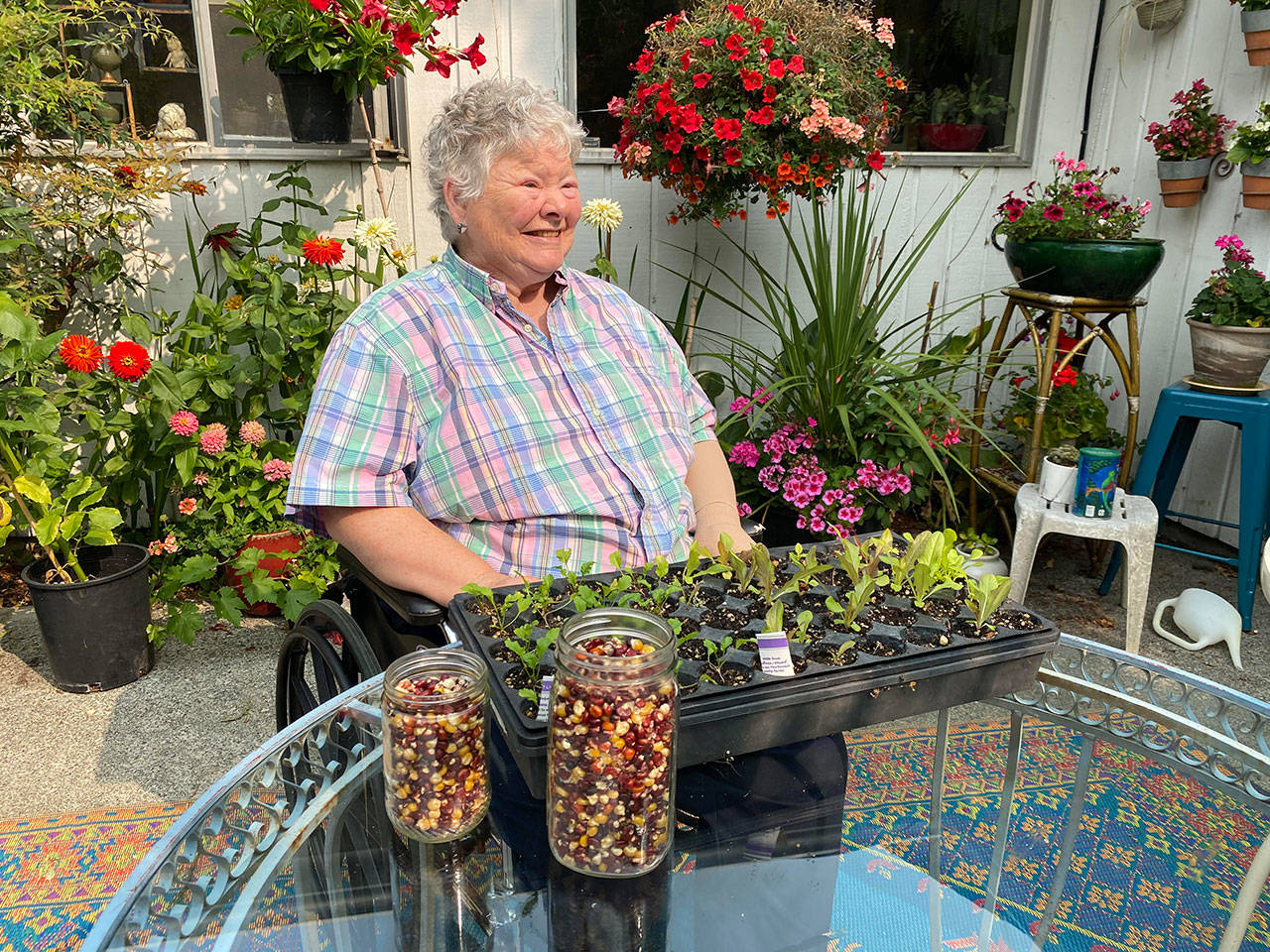Food Security and sustainability have found their way into all our lives during this time of COVID. Seed sales emptied shelves as fast as they could be stocked during the spring as many engaged or re-engaged in growing food both as therapy and as a vital need.
This profile is about an inspiring neighbor, backyard farmer and champion seed saver, Lotus (who goes by a single name). There is no farm stand involved, instead, there is a fully stocked pantry to feed her family, a cabinet of seeds to start next season and an abundance of food to share with family and friends.
Stepping into Lotus’ and Barbara Smith’s backyard farm is like entering a colorful wonderland of nourishing joy. Holding court over their miniature agricultural domain is Lotus, with a perennial twinkle in her eyes and easy giggling laughter.
As a young girl in Seattle and Vashon, Lotus and her siblings helped their dad in the family garden, planting seeds in spring following the string line their dad set and in late summer, hunting and digging potatoes after their dad loosened the soil.
Fast forward to the 1970s, Lotus planted her Vashon garden by digging up a pasture, not realizing how challenging pasture grass can be. The result was a delicious crop of green beans and a new awareness that there is much to do after a bountiful harvest.
About ten years ago, after retiring from teaching carpentry and high school completion, Lotus and Barbara bought a house a short walk from town with a generous backyard.
The beginning of a garden was just off the kitchen patio and the back half of the property was dominated by blackberries.
A former student gave Lotus a permaculture book, “Gaia’s Garden,” by Toby Hemenway. She read it cover to cover, visited gardens around the island, and then rolled up her sleeves and began digging and experimenting.
Wanting to use roof water for the gardens, Lotus’ first of many experiments was creating a now-abandoned greywater system that provided lots of information for how water catchment systems work or don’t work. She then created an intricate rain barrel system complete with goldfish to eat mosquito and larvae.
Over the years, the garden has grown to encompass most of the couple’s almost half an acre, plus they have absorbed part of their neighbors’ back yard. A high arch of copper beech and vine maple trees separates the front garden from the back and invites a visitor to explore the experiments of this endlessly curious gardener.
Meandering reveals a hukelkultur (a raised garden made of branches, grass clippings and other organic matter) here, a compost pile there, a nectarine tree with its own private bug shelter. The back gardens, formerly covered in blackberries, now are filled with flourishing fruit trees, berries, vegetables and chickens cohabiting symbiotically with randomly seeded colorful flowers.
Lotus has not always been a believer of flowers in the garden. She said she thought they were what she called “fru fra” — a waste of water and energy. She admits now that she intentionally neglected to run water lines to the flower garden. It was a crisis when she noticed Barbara paying more attention to the flowers in their front yard than to the food growing in the back. Always reading and learning, she discovered the beneficial relationship between flowers, pollinators and predatory insects. Now there are water lines to the flowers.
Flower seeds have also won a spot on the seed-saving shelves. Like many of us, Lotus began saving seeds in a haphazard way and now has a cabinet full of boxes, cans, jars of seed from her garden and seeds gifted and traded. Lotus’s first seed saving experiment was broccoli before she learned how difficult the delicate broccoli seed is to save and that they will cross with anything left alone as a single plant. When she planted her saved broccoli seed, it grew to 6 feet tall and bushy, but not a broccoli head to be found. The leaves tasted awful, the experiment did not yield the desired result — but it did provide information and more curiosity about why. For Lotus, a failed experiment is an opportunity to read, research and try again.
When I asked Lotus what inspires her, she told me, “Learning about plants, what they need to grow, how they adapt and survive, how they pollinate and interact with each other. The ecology of how it all works together fascinates and inspires me.”
A woman with deep earth wisdom, boundless curiosity and the most generous of spirits, Lotus is a dedicated learner and one who expansively shares what she learns.
Two years ago, Lotus was diagnosed with Corticobasal Degeneration, a rare progressive brain disorder that like Parkinson’s causes a loss of motor skills among other symptoms. Addressing the frustrations of her condition, she said “I can find joy every day but not all day.”
You may see her motoring about in her electric wheelchair aided by Barbara, their son Sonam, neighbor Thea or her caregiver friend, also named Barbara.
Lotus says her blessings are her family, community and her garden. And so it was during my visits to interview Lotus — family and friends coming and going, laughter and conversations riding on the wings of hummingbirds dashing from flower to flower to feeder.
Lotus is in the middle of the laughter, directing and orchestrating.
Hanging out with Lotus is inspiring. Her calm and humble presence; her fearlessness to try anything and start anywhere; her effervescent curiosity.
Go ahead, try something!
— Karen Biondo is a farmer and chef who currently cooks home delivery lunch for the Vashon Senior Center. She is also a member of VIGA’s Food Access Partnership. She enthusiastically encourages everyone to try anything in the garden (and in life). She practices curiosity on a daily basis. Reach Biondo at labiondo@comcast.net.


